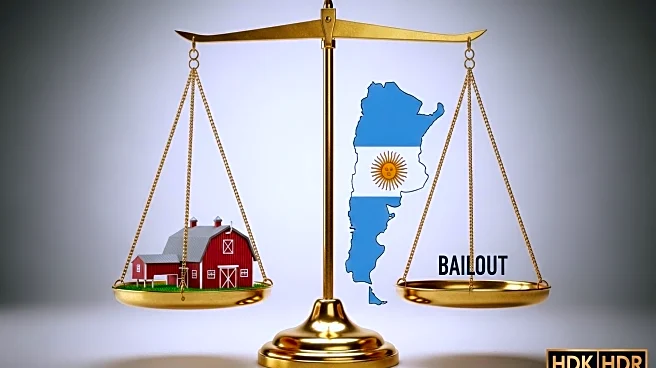What's Happening?
President Trump has announced a $20 billion bailout package for Argentina, aimed at stabilizing its economy. This decision comes amidst a government shutdown in the U.S., leaving American farmers without anticipated relief from tariffs and inflation. The bailout includes a currency swap and other financial aids, as confirmed by Treasury Secretary Scott Bessent. This move has sparked criticism from U.S. farmers and Democratic representatives, who argue that the bailout undermines American agricultural competitiveness. The bailout is seen as beneficial to hedge fund manager Rob Citrone, who has significant investments in the Argentine economy.
Why It's Important?
The allocation of U.S. financial resources to Argentina has significant implications for American farmers, who are already struggling with the effects of tariffs and inflation. The bailout could make Argentine agricultural products more competitive on the global market, potentially displacing U.S. exports. This decision has raised concerns about the prioritization of foreign aid over domestic agricultural support, especially as U.S. farmers face economic challenges. The situation highlights the complex interplay between international aid and domestic economic policies, with potential long-term impacts on U.S. agricultural sectors.
What's Next?
U.S. farmers and political leaders may increase pressure on the administration to reconsider the allocation of resources and to provide more support for domestic agriculture. There could be calls for restoring federal programs that assist farmers with energy costs and land conservation. Additionally, the political ramifications of this decision may influence upcoming elections, as stakeholders assess the administration's priorities. The response from Congress and the agricultural community will be crucial in shaping future policy directions.
Beyond the Headlines
The bailout to Argentina underscores the broader geopolitical strategies at play, where economic aid is used as a tool for international influence. It also raises ethical questions about the use of taxpayer money for foreign aid when domestic industries are in need. The decision may reflect broader ideological alignments and economic strategies that prioritize deregulation and reduced government spending, both domestically and internationally.










